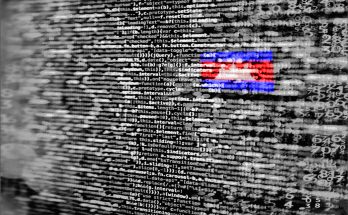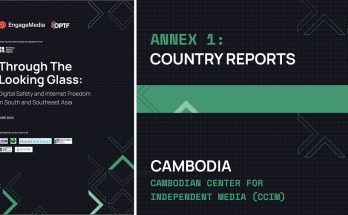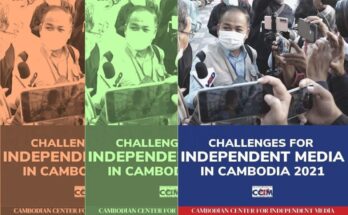Emma Fosher
The Cambodian Centre for Independent Media (CCIM) was set up in 2007 and registered with the Ministry of the Interior as a Non-Governmental Organisation. The idea of the organisation is to provide an independent media network throughout Cambodia. Voice of Democracy (VOD) was started in 2003 by the Cambodian Centre for Human Rights (CCHR) and under close supervision until it became independent when CCIM was established. At the start up of VOD, just a 20-minute radio programme was broadcast daily to the capital city of Phnom Penh. According to the Cambodian Centre of Human Rights (CCHR) as reported in their History of VOD article, this quickly progressed to twice a day and by the end of 2006, VOD news broadcasts were being listened to by 26% of the capitals radio listeners.
Eventually broadcasting by VOD was spread across five radio stations for 2 hours a day in five different provinces. Then in 2008 CCIM began operating its own radio station in Phnom Penh, Sakira FM which broadcasts for 16 hours each day. By 2010 Sakira FM had a coverage area of 14 of Cambodia’s 24 provinces allowing for a potential listener count of 8.5 million. The most recent development is the Voice of Democracy Hot News website which has allowed for the expansion to a global audience.
Mr. Teang of VOD provided information about VOD’s contribution to previous elections saying the NGO always dedicate airtime during every election period to produce and provide news updating the public of the ongoing process of the elections. Also, they allow equal slots for each political party to introduce their respective policies and this gives time for a public discussing on air with a political party representative.
In the few weeks running up to the commune elections that were held on Sunday 3rd June 2012, Voice of Democracy (VOD) has contributed in numerous ways including publishing breaking news on the elections and interviewing each party about their policies.
The election period has been a very important time for VOD. As a Non-Governmental Organisation that promotes democratic governance, it is crucial that it is projected into the elections. With a vision from CCIM of: “Every Body Well informed and Educated, Every Body Developed”.
Using the radio broadcast sector, the aim of the Cambodian Centre for Independent Media, who use VOD as their brief for radio programme Sarika FM, is to increase freedom of the press. VOD news department have found this very important and influential in the election process since news reports have been published about each party and have been broadcast through the radio station to inform the Cambodian citizens.
During the election campaign, VOD produced a radio programme known as “Process Toward Election”. This began on the 18th May 2012 and finished on the 1st June 2012. All the stories were related to the commune election and were repeated twice a day, once at 12noon and then again at 6pm. The news was a daily update of the process of the commune elections and what development had occurred over the days leading up to them.
VOD cooperated with the National Democratic Institute (NDI) in a way which allowed them to broadcast the debate forums that NDI had conducted with political parties across the provinces. This programme was broadcast for three hours a day in the 11 days running up to the election. The idea of this was to inform the listening population of Cambodia to enable the votes to be free and fair. Alongside this, VOD also worked with the Neutral and Impartial committee for free and fair elections (NICFEC). This organisation works on election education, monitoring and advocacy. In the run up to the elections the NICFEC produced educational spots to further inform the local citizens. VOD broadcast these spots through their radio station Sakira FM three times a day for two weeks before the election.
To gain the information for such reports which have been published on the VOD hot news website, interviews have been conducted by staff members of VOD to senior officers of five of the elective parties, all of whom have a seat at the national assembly. The five parties were The Cambodian People Party, The Sam Rainsy Party, The Human Rights Party, The Norodom Ranariddh Party and The Funcinpec Party. They were requesting information such as the policy each party has and what they have been doing to campaign for the commune elections. As a key question, it was also asked what the party would do to solve the issues in each commune should they win the election and what commitment they had to address the communes problems.
Ms. Hok Narin from VOD provided information on the five political party interviews. Each party were asked questions that focused on three main problems.
The first problem to be addressed was the corruption in public services throughout the communes, with the commune council overcharging people. Alongside this was the fact that it was often the case that marriage registration only occurred in 30-50% of marriages. When asked about how they would change this, the Cambodian People Party said they would not allow the commune councils to overcharge the residents anymore, and sent their apologies to those who had been affected in the past. They also sent a message encouraging residents to inform the local authority if it occurs again, through which a complaint to the courts would go ahead. The Funcinpec Party said they would not allow the commune council to collect the money from the residents, and if the residents were to complain about a way of collecting money they will withdraw that way and change to another option. The Human Rights party were very concerned with this issue, claiming it was a priority issue and if the commune council were to do this the responsible individual must resign from their position. They said they would monitor this through complaints of the residents. When asked on the same issue, the Sam Rainsy Party said they would monitor the implementation of the commune council, and oversee who obtains the money from the residents. The Norodom Ranariddh Party claimed this to be part of a principle 7 points with the first point being that the council must stop overcharging and the residents should identify with the minister of the interior, not the commune council.
As a general point, all 5 parties agreed that the reason residents won’t register their marriages is because the commune councils try to take too much money from them, and they don’t want to spend more money than they have to. Each party therefore said they would put strong restrictions over the commune councils to prevent this overcharging happening. They also said people need to be informed about civil certificates, and this information will be provided to the residents largely through the media, such as radio broadcasts and leaflets. They all identified that the problem had arisen originally as the Ministry of the Interior hadn’t offered information documents in a good time, as there were often delays in publishing.
The second problem to be addressed was the lack of participation of residents in monthly commune meetings. All of the parties said this was a big disadvantage, and said the commune council must from now onwards be anti-corruptive and must promote transparency. All activity carried out by the commune council should be communicated to the people, so that they are informed and can attend and contribute to the monthly meetings. This would provide an opportunity for them to express their concerns.
The third problem was a lack of transparency in commune development plans particularly concerning commune development building. The parties all identified that companies should publish information about building within a community and therefore many people can join in the building process, helping to develop a better commune for everybody.
These issues were highlighted in a report created called the Communes Good Governance Report, which was distributed to the political parties and MP’s. Meetings were held with certain party leaders to brief them about the report findings and to give recommendations for commune management improvement.
The VOD team have also produced a round table and invited the independent analysers and experts of the elections to discuss what the successes and failures of the first and second mandates of the commune council. This has enabled VOD to produce various news stories before, during and after the election campaigns by comparing the successes and failures as the procedure has progressed.
Further to this, many hours of live radio programmes have been broadcast to distribute knowledge around the city. The idea behind the programmes was that a large amount of information could be distributed, educating the citizens of Cambodia so that they could make the right decision when they took the vote. The programmes included breaking news stories about the election and general party policies. Additionally, information was provided daily about the current situation of the election and the perspective of the Election Day from many of the election stations throughout the country.
As for the irregularities of this year’s election processes, VOD deployed team members to a variety of polling stations and then aired complaints such as a citizen not being able to find their name on the voting list, a lack of legal papers being available to show eligibility to vote, and the presence of commune chief at polling stations which is prevented by election laws.
The idea of this is to inform local citizens about the elections and what each party stands for, in order to promote democracy and fair and free informed voting. To broadcast to a large audience means more people become aware and are more inclined to vote, particularly underrepresented groups such as women. Even though the Ministry of Information prevented VOD from broadcasting news over 2 days, VOD still did their upmost to advocate all kinds of news related to the election situation right up until they prevented the broadcast. This dedication from VOD enforces the perceived importance of educating the local citizens in the commune election process to encourage the informed voting.
A special live show has been running, monitoring the whole process of the election throughout the country. An interview was conducted with the president of the Provincial Election Committee (PEC), as well as the National Election Committee (NEC), both Non-Governmental Organisations who are working on the elections, and a VOD correspondent if present in some provinces. The hard work of VOD has been demonstrated effectively through the successful broadcasting and news reporting to keep citizens up to date with the election processes. As a result, it is thought that many more people will have voted as they had a significant and substantial amount of information to allow them to be certain about the voting process and through making the right decision, confidence in what they were voting for.
To finalise the contribution of VOD to the commune elections, the public have been informed of the results of these elections with an explanation of what VOD did on the polling day. VOD had planned to produce five hours of special radio programmes on the day of the election, which had the ban not have occurred by the Ministry of Information; it would have been broadcast from 7:30-9am, and from 3-6:30pm. These special programmes were produced by the production team at VOD who were connecting to reporters that had been deployed to various provinces. In addition to this, the production team also conducted live interviews with NEC officers for their opinions on the election procedures and also the PEC who are the local committee who organised the election.
Mr. Teang of VOD gave his opinion on how the banning of broadcasting by the Ministry of Information affected VOD’s aim of informing the citizens, “The ban seriously impacted on public feeling. For the length of the ban, VOD was not able to keep people informed of fresh news, which led to the public perhaps suspecting that negative things were happening in society and suspecting of tricks by the government in the elections, therefore leading to public doubt of confidence in their government. To get around this we used our online website to keep the public as up to date as possible”.



